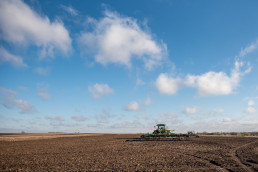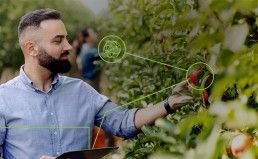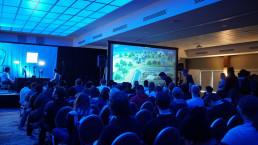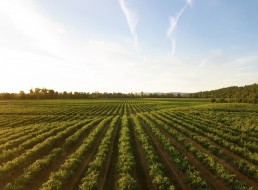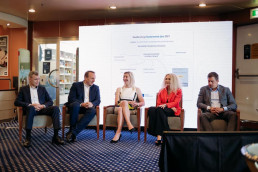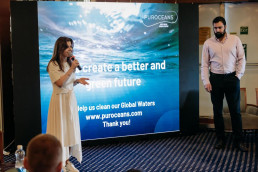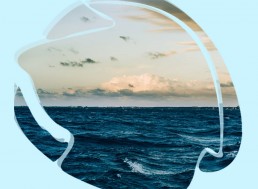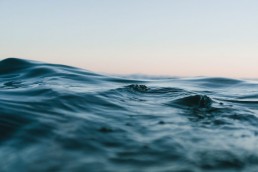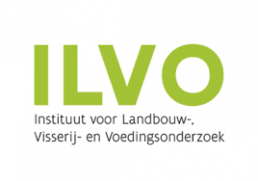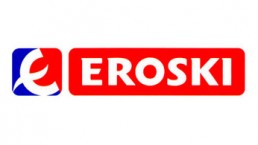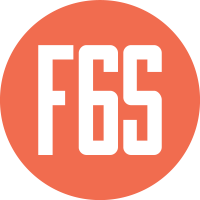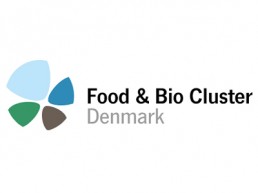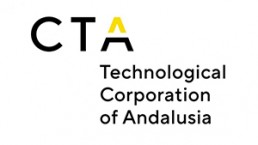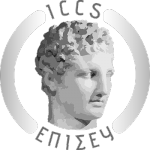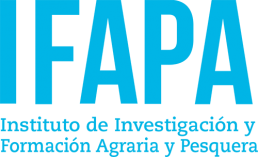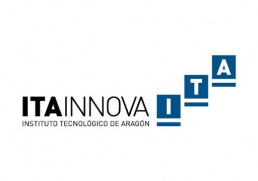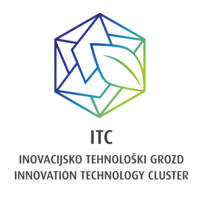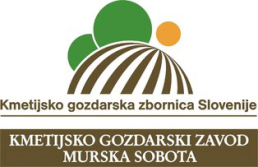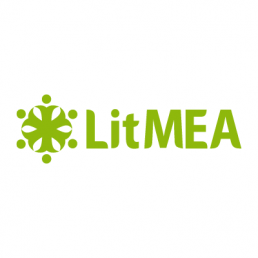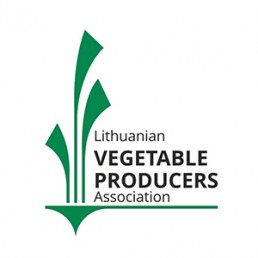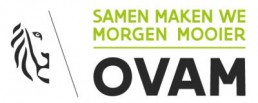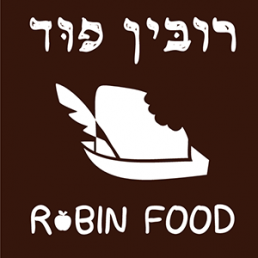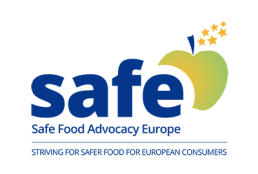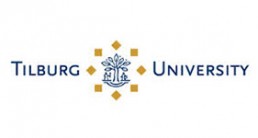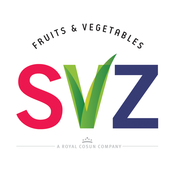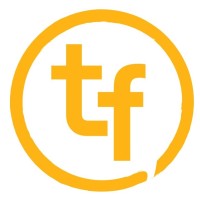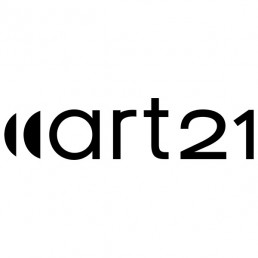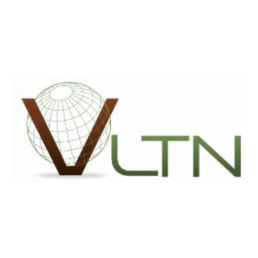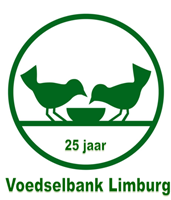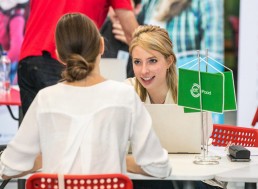After webinar aimed at farmers
A webinar aimed at farmers, but beneficial to everyone interested in agriculture and its progress, organized by AgriFood Lithuania DIH, took place on Tuesday. More than 70 participants joined the event.
During her welcome speech, director of the AgriFood Lithuania DIH Kristina Šermukšnytė-Alešiūnienė announced that this will not be the only such event for farmers. In September, four such webinars will be organized on Tuesdays, where experts and business and science leaders will share their competence and knowledge.
During the event, Thomas Ronlev, Chairman of the Board of the Lithuanian Robotics Association, introduced the trends of robotics and the good practice of robotics application in world farms. Also, Vytautas Liakas, Docent of the VMU Academy of Agriculture, presented the benefits of artificial intelligence-based robotics solutions to farmers and highlighted necessary competencies, for the development of which agricultural specialists should pay special attention. Finally, Artūras Jakubavičius, Head of the Innovation Support Department of the Lithuanian Innovation Center, presented existing opportunities to attract support funds for the establishment and development of agricultural business.
In the discussion that followed the presentations, Giedrius Bagušinskas, Director of the Lithuanian Food Exporters’ Association LitMEA, together with Vytautas Liakas, Docent of the VMU Academy of Agriculture, and Artūras Jakubavičius, Head of the Innovation Support Department of the Lithuanian Innovation Center, answered the questions of the participants.
The AgriFood Forum 2021 will propose a new direction
The AgriFood Forum 2020 was a real surprise. The two-day forum, which was organized virtually for the first time, attracted more than 1,800 unique viewers, 500 of whom were participants from abroad. What is more, each participant spent an average of more than 4 hours on the forum. The AgriFood Lithuania DIH, the main organizer of the event, has a very clear mission for the AgriFood Forum 2021. According to the hub, it is time to turn ambitions into real actions and commonly agree on the implementation of the sustainable food supply chain. The hybrid AgriFood Forum 2021 will take place on 25th of November.
“The agri-food sector does not have its own separate concept and is therefore often treated as a separate part of Industry 4.0. However, in Lithuania this sector is rapidly transforming and even acquiring the features of Industry 5.0. In this context, the synergy between man and technology, combining the human mind and creativity with the efficiency of technology, becomes paramount. We must unite business and scientific efforts and both create a clear vision and mission of our country's agri-food sector for the coming decades, and show its importance for Lithuania's growth. This will not only create a sustainable and healthy environment, but will also attract large investments and encourage young people to take an interest in the field of agri-food and create value for Lithuania in the regions,” said one of the speakers of the AgriFood Forum 2021 Vytautas Magnus University Rector Juozas Augutis.
Two clear directions of the forum can be identified in the concept being developed by the forum organizers. The agrifood sector is often underestimated as an underdeveloped sector where high value-added products are not developed. This is a myth that the organizers will destroy by proving the connection of this sector with IT and the most advanced technological solutions being developed on the market. Secondly, the agrifood sector is particularly cross-sectoral and important for the social development of our society. This will be proved by the smaller forums that will take place on different stages during the forum, covering topics ranging from agriculture to the importance of renewable energy, logistics, investment, education or rural development.
Augustas Alešiūnas, CEO at ART21, emphasized the rapid technological development of the sector and its potential to keep growing. "The agri-food sector is experiencing a peak period worldwide. Europe is focusing on the development of technologies related to 5G, robotics and autonomous technology. The growth trends of the sector are stimulated not only by the direction of the Green Deal initiated by the European Commission, but also by the decisions of private investors to continue investing record amounts into technologies developed for the agri-food sector. They do this because they see the potential in the agri-food sector to develop solutions that will generate huge returns. If we, as a state, do not miss this opportunity, our country's innovators could create novel solutions and generate great value for the Lithuanian economy,” Augustas Alešiūnas, another speaker of the AgriFood Forum 2021, presented the international context.
This year, the main topic of the AgriFood Forum is the implementation of a sustainable food supply chain by enabling synergies between primary actors – farmers – and other stakeholders such as processors, distributors, consumers and policy makers. The organizers of the forum would like to inform everybody that the event is free of charge and invite everyone to register.
In September, four webinars for farmers
In September, AgriFood Lithuania DIH is organizing four webinars for farmers on different AgriFood related topics. Participants of the webinars will hear the latest information on the current situation in the sector and will learn more about future trends and potential opportunities.
Various experts and business and science leaders from Lithuania will share their experience, knowledge and competence during informative presentations and interesting discussions.
Participation in webinars is free of charge, but due to the limited number of people who can join, pre-registration is required. Although the webinars are aimed at farmers, they will benefit anyone interested in agriculture and its progress. Please register by clicking on the seminar topics.
In addition, if needed, AgriFood Lithuania DIH will issue seminar participation certificates.
Topics and dates of the webinars:
September 7 , 10 AM. Lithuania after COVID-19: the importance of robotics in the agricultural sector
September 14 , 10 AM. Agricultural Perspectives 2021-2027
September 21 , 10 AM. Farming in the digital age: what are we ready for now?
September 28 , 10 AM. The Green Deal: Digital Innovations in Lithuanian Agriculture
EIT Food is looking for experts that would like to participate in the EIT Food RIS Policy Council from Lithuania
Background information: EIT Food RIS Policy Council
RIS Policy Council is a policy advisory body established in 2019 to support dialogue and other interactions in RIS countries, contribute towards the further elaboration of EIT Food instruments and projects, as well as promote linkages with government authorities and other stakeholders.
RIS Council consists of stakeholder representatives from EIT RIS countries. The Council supports EIT Food in policy dialogue and other interactions in the target countries, intending to synchronize the development of EIT Food portfolio with national or regional Smart Specialization Strategies of the targeted EIT RIS countries. EIT Food RIS Council strengthens synergies with EIT RIS stakeholders. Interactions with regional stakeholders will support the active involvement of EIT Food representatives in the Entrepreneurial Discovery Processes in targeted EIT RIS countries and regions. Through policy dialogue with national and regional authorities that select AgriFood related topics as their Smart Specialization Strategies, EIT Food expects to develop and implement joint innovation and entrepreneurship strategies with Knowledge Triangle partners from the selected EIT RIS countries.
Benefits for the Members of the EIT Food RIS Council
The Members of the EIT Food RIS Council may:
- officially use the title of the Member of the EIT Food RIS Policy Council,
- participate in EIT Food RIS activities, such as EIT Food Government Executive Academy, EIT Food Awareness Events, Demo Days, cross-KIC Events gathering other EIT Communities,
- have an impact on the design and implementation of EIT Food RIS activities,
- increase your network across EU,
- Expand your knowledge on different innovation policies and AgriFood related innovation projects.
EIT Food will cover the costs of participation of the Members in at least four EIT Food RIS Council meetings in 2021 and 2022. Each participant will be granted 1000 € yearly.
How to apply?
Deadline for application Interested and eligible individuals are invited to submit their application by 26 August 2021, 23:59 CEST, referring in the e-mail title to Call for EIT Food RIS Policy Council members 2021- 2022.
Please send the electronic version of the application to: edita@agrifood.lt
The "Digital Sea" Conference has the active involvement of cross-sectoral leaders
On a hot summer Thursday, a hybrid international conference “Digital Sea 2021” took place on the DFDS ferry Athena at the Klaipėda Central Seaport Terminal. Organized by the Digital Innovation Hub “AgriFood Lithuania DIH” and the European Union’s leading food innovation initiative “EIT Food”, the conference was the first event of this level and depth focusing on the challenges and digital opportunities at sea in the context of twin transition. The blue economy, its digitalization, “green” effects and sustainability have brought together a particularly wide range of leaders from cross-sectoral political, business, scientific and social organizations to speak, listen and seek common ground. As many as three ministries – the Ministry of the Environment; Transport and Communications; Energy – strategic state-owned enterprises, agencies and market-leading businesses took an active part in the conference.
At the beginning of the conference – the kick-off of “EDIH Lithuania.lt”
At the end of last year, a consortium has been established by eight leaders from different sectors in Lithuania. During the competition, it was recognized as the best and most in line with Lithuania’s interests in providing digital transformation services to business entities in the Central and Western Lithuania region and was nominated by the Ministry of Economics and Innovation to the European Commission to become the European Digital Innovation Hub. During the conference, the official start of “EDIH Lithuania.lt” took place.
“This is proof that organizations with different goals, which are selfish in nature, understand the meaning of working together. By working and collaborating together rather than competing internally, we can achieve much bigger and faster results. I have no doubt that the members of this EDIH will become a cohesive team and will help to implement digital solutions in Lithuania efficiently and quickly,” – said Augustas Alešiūnas, one of the founders of this Hub, founder and CEO of the agri-food digital technology company “ART21”.
The Minister of Environment focuses on new business models
According to the Minister, the Baltic Sea is special in that it is very shallow, the water in it is renewed only every thirty years, therefore a drop of diesel falling from a yacht or a motor boat floats in the ecosystem for so long that it can deprive a lot of wildlife opportunities. And if we do not reduce phosphate and nitrate emissions into the Baltic Sea, the prospect is that the decision to ban salmon and sea trout fishing on the Baltic coast may soon be taken together with the Minister for Agriculture. Few know that cod fishing has been banned in the past. “These are symptoms that show that we are not living according to our capabilities and that we are depriving our children of the opportunity to eat fish from the Baltic Sea,” said Minister Simonas Gentvilas at the Digital Sea conference.
An inspiring example is the European Union’s plan to extend pollution permits to the maritime and road sectors. According to the Minister, this makes it possible to predict a significant change in the logistics sector, as companies will be able to quickly switch to clean technologies and thus save the number of emission allowances, which they can later sell and earn extra from it. According to Simonas Gentvilas, this is a turning point that Lithuanian companies should be wide awake for.
The speakers who took part in the discussion agreed unanimously that having a green port in Klaipeda is realistic by the end of this decade, but it is necessary to clearly define in society how it understands the green port and what indicators should be used to measure it. This is necessary in order to have a common understanding and not to lead to unnecessary discussions simply because of different visions. According to Vidmantas Paukštė, Infrastructure Director of Klaipeda State Seaport Authority, the port is determined to follow a sustainable and harmonious course, which would have zero emissions and be green in the future.
The importance of aquaculture production is growing
The panel, organized by “EIT Food”, the European Union’s leading food innovation initiative, focused on the challenges and benefits of sustainable aquaculture. While giving the speech, Jouni Vielma, lead researcher at the Finnish Institute of Natural Resources (Luke), emphasized the importance of technology that will open up opportunities to increase the sustainability of aquaculture. He pointed out that digital solutions are important in all value chains from manufacturing or processing to retail. According to discussion moderator Mercedes Groba, “EIT Food” strives to contribute to sustainable aquaculture through innovation, education, business creation and communication.
Experts have argued that it is not the speed of research and innovation that is a problem holding back progress. According to them, the biggest challenges are legal and administrative barriers that block the rapid development of innovation, because at the research level, everything is going great. Unless there is a mismatch between science and business, as sometimes researchers move too far away from the daily routine on farms. It was also emphasized that sustainable aquaculture requires the cooperation of all stakeholders and that educating consumers about healthier and more sustainable foods and not relying solely on information on social media is essential.
In addition, the discussion highlighted the consensus among experts that the importance of large global technology companies in the food sector is growing. And while the salmon industry is the engine of aquaculture technology, solutions are also needed that encourage the development of advanced solutions into other areas of aquaculture.
The future of logistics is a unified network, digitalization and progress
Convenient connections, friendly environment and high return – such a future was outlined by the Deputy Minister of Transport and Communications Agnė Vaiciukevičiūtė for Lithuanian logistics. According to her, the green agenda and digitization are the areas that will receive special attention from the government.
Andrius Pranckevičius, Deputy Chairman of the Board of “Linas Agro Group” has offered a thought that he would be most inspired by a sustainable and green long chain from the production to the final person consuming the product in any part of the world. According to Kristina Šermukšnytė-Alešiūnienė, Director of the Digital Innovation Hub “AgriFood Lithuania DIH”, the state must actively contribute to the transformation of sectors. According to the digitalization expert, Lithuania, as a small country, should take advantage of this and try out the possibilities of integrated logistics, connected into one efficient system in different sectors.
Digitization requires bold decisions and leadership
Daina Kleponė, General Manager of “Versli Lietuva”, said that the biggest breakthrough always comes from the state, which determines a certain direction and needs. According to her, there are many examples related to the U.S. military. “About seventy percent of the technologies created by innovators do not stick, because it turns out that no one needs them. Digital innovation hubs should play an important role in the innovation ecosystem, so that they, just like a pharmacist, could choose the most suitable digitization methods for individual companies or sectors,” – spoke Augustas Alešiūnas, the CEO of “ART21”, at the conference discussion.
“There is no need to fear unsuccessful investments. If we have ten of them, it is likely that nine will burn, but the lucky one will buy them all back and create added value. However, if we want to have strong innovators, the state needs a long-term vision for innovation, which would not be limited to short-term incentives.” – the thought was shared by Acting Lithuanian energy agency director Virgilijus Poderys.
Energy is going through a turning point
Deputy Minister of Energy Daiva Garbaliauskaitė presented Lithuania’s future goals in maritime energy, where the Ministry sees great untapped potential and an opportunity for our country to secure energy independence. It is planned to develop two offshore energy parks with a capacity of up to 1,400 megawatts by the end of the decade. The parks themselves are planned to be 30-40 km from the shore, and expert calculations show that the Baltic Sea is one of the most attractive European seas for developing wind energy due to the prevailing winds, with a potential of more than 3 gigawatts in Lithuania.
Aleksandr Spiridonov, CEO of “Ignitis Renewables”, who took part in the discussion, said that the contribution of marine energy would quadruple in less than ten years and, according to him, this is a great opportunity for Lithuania to become an electricity exporter. In addition, wind technology itself has halved in price in five years, so there is no need to worry about the potential high prices of offshore wind energy (as it once was). Rokas Pečiulaitis, the founder and CEO of “Contrarian Ventures”, was sure that the next century would be an electron century with flexible electricity prices dominating in the market. In addition, the venture capital fund manager said shipping is the sixth largest polluter in the world after Germany. Electrification of shipping, which will significantly save fuel and even maintenance costs, will have to happen.
We have the winners of the hackathon "HACK DigitalSea'21"
The first online hackathon "HACK DigitalSea'21" in the Baltics was launched in 3-4 of July, where participants sought innovative solutions to the acute challenges for sustainable aquaculture in the Baltic Sea. .
The solutions were evaluated by an international jury, which selected the winners in three categories: the most advanced solution, the strongest idea, and from zero to hero that showed progress from the idea stage to a prototype during the hackathon. The winners of each category were awarded a cash prize of 4000 EUR.
The Latvian team PureOceans won in the category “The most advanced solution”, with their technology solution that cleans rivers and seabeds from 98% of oil and microplastic pollution. Team leader Alona Stepanenko emphasizes the team's participation in the hackathon: "Participation in this event was one of the best experiences we have ever had. The overall level of professionalism of the mentors was extremely high and all the ideas, thoughts and advice they shared were very valuable. We can thank them in advance for any future success we will have."
The Latvian team DronePlan won in the category “The Strongest Idea”. The team's solution is to use automated drones to collect pollution data and provide automated system analysis for pollution mapping. Meanwhile, NPeter - a team of students from Lithuania formed during the event - won the award for the greatest progress from the idea to the sketch of the first prototype.
Within two days, the teams validated their solutions, improved business models, and consulted with 23 industry representatives, experts and business mentors from the three Baltic States. A total of 72 mentoring sessions were conducted over two days.
The Digital Sea Hackathon took place for the first time in cooperation with three EIT Food hubs in the Baltic region - AgriFood Lithuania DIH, Riga Technical University (RTU) and Tartu Biotechnology Park. The organizers invited researchers, entrepreneurs, experts in the field, technology developers and students from various fields to participate. More about hackathons and challenges: www.hackdigitalsea.lt
EIT Food is a knowledge and innovation community of the European Institute of Innovation and Technology (EIT). By forging close links between consumers, businesses, start-ups, researchers and students from across Europe, EIT Food supports innovation and sustainable economic initiatives that increase access to quality food, improve the environment and health, create new jobs and increase Europe's competitiveness.
The Perspectives of the Blue Economy and Digitisation in Lithuania in the Digital Sea Conference
The importance of the blue economy is growing in the European Union: its contribution to the national budgets is increasing, the number of jobs created is growing, and the importance of sustainable aquaculture for nature, people and their food chain is becoming increasingly clear. In addition, the blue energy from the sea represents a huge unrealised potential for energy that will in the near future attract a large amount of investment, generate significant economic returns for society, help protect the environment and strengthen energy independence. The political and business leaders will discuss effective digital solutions to enable Lithuania’s blue economy at the Digital Sea Conference on the 8th of July. Participation in the conference is free of charge, but pre-registration is required due to the limited number of people who can join.
The Topic Is Relevant Throughout Europe
This will be the first ever exclusive top-level international conference in Lithuania on the challenges and digital opportunities at sea in the context of the twin transition. In addition, this conference is the only one in our country and one of the few events in Central and Northern Europe to have been awarded the right to be part of the European Commission’s initiative “European Maritime Day”. According to the event organisers AgriFood Lithuania DIH, this conference is an excellent opportunity for Lithuania to take stock of the challenges, resources and opportunities available in the Baltic Sea and to send a clear message to the public, businesses and decision makers across Europe.
Per Kristina Šermukšnytė-Alešiūnienė, the Director of AgriFood Lithuania DIH, “Aquaculture is an important part of the food sector that is unnecessarily neglected, the importance of the blue economy is growing rapidly and has no intention of stopping, and the Baltic Sea is home to many challenges that need to be addressed. However, we do not talk enough about the digital opportunities that exist in the sea in the context of the twin transition. Enabling and turning the existing digital opportunities at sea into benefits will be the focus of the international Digital Sea Conference.”
The event organisers hope that the message sent by Lithuanian business and political leaders will reach a wide European audience. The conference, which will take place on the DFDS ferry in Klaipėda, will be streamed live on partner platforms and translated into English and Lithuanian. In addition, EIT Food, Europe’s leading food innovation initiative, is one of the organisational partners of the conference. Marja-Liisa Meurice, Head of the Innovation Programme of EIT FOOD and the Director of the EIT Food CLC North-East, shared her thoughts: “Despite multiple challenges that the aquaculture industry is facing, it will make an important contribution to protein diversification, find solutions to reduce pollution in Blue economies and support actions in the protection of ecosystems. The European aquaculture sector has room to grow in Europe and to create a sustainable business.
The Baltic Sea can be Sustainable
According to scientific data, the Baltic Sea is the fourth most polluted sea in the world and transports around 15% of the world’s freight. It is also heavily affected by chemicals and eutrophication, with agricultural pollution and inadequate sewage treatment being major contributors. Studies show that almost 97% of the Baltic Sea is eutrophic and that the area of anoxic bottom zones is increasing, now covering around 17% of the seabed (150 years ago, such areas did not exist). Therefore, effective coordinated action is needed to reduce pollution and increase the resilience of the Baltic Sea to the adverse effects of nutrients. Otherwise, the Baltic Sea will simply become a swampy pond. In addition, there are the challenges of pollution from the Port of Klaipėda and the ongoing debate on what to do about chemical weapons on the Baltic seabed.
The Minister of the Environment Simonas Gentvilas, the Adviser to the Prime Minister Dalius Krinickas, the Director of Infrastructure at Port of Klaipėda Vidmantas Paukštė, and the Mayor of Klaipėda municipality Vytautas Grubliauskas will discuss innovative solutions to these challenges.
The Sea – Unrealised Potential for Electricity
According to the Minister of the Environment Simonas Gentvilas, Lithuania spends €2.5 billion annually on energy imports alone. Can marine energy help keep this money in Lithuania? According to the organisers, this will be one of the topics that will certainly be touched upon during the conference. The European Commission has set a target to increase the amount of renewable energy coming from the sea to 5 times by 2030 and 25 times by 2050. Is Lithuania ready for this? If so, how is Lithuania planning to exploit the new opportunities?
According to Dainius Kreivys, the Minister of Energy, who will be giving a speech at the conference and participating in the discussion, with the fight against climate change becoming one of the world’s top priorities, it is changing energy production, industry and households in a comprehensive way, which is why the rapid growth of the green energy production is one of the country’s most important goals. Lithuania is committed to meeting the targets of the European Green Deal and to generate half of its electricity from renewable sources by 2030. “The successful 'employment' of the offshore wind for local generation is one of the key pillars of Lithuania’s green transformation. The planned 700 MW offshore wind farm in the Baltic Sea would generate around 25% of the country’s current electricity demand,” says D. Kreivys.
Another imminent energy challenge is the massive electrification changes that await maritime transport. According to Rokas Pečiulaitis, the Founder and Director General of Contrarian Ventures, there are around 50.000 cargo ships in the world, which emit more than 900 million metric tonnes of CO2 and other pollutants into the atmosphere every year. According to a participant in the forthcoming debate, we need to be clear about the scale of the fact that the 15 largest container ships emit more sodium and sulphur oxides and other pollutants than all the vehicles in the world combined. “This is a clear problem and a technological challenge to electrify the entire world’s cargo fleet in a short period of time, not only to protect the environment but also to save operational costs,” says Pečiulaitis.
The challenges and opportunities of logistics in exploiting the sea route and digital innovation solutions for the creation of the future sea will also be discussed at the conference. Among the speakers at the conference are the Minister of the Environment Simonas Gentvilas, the Minister of Energy Dainius Kreivys, the Deputy Minister of Transport and Communications Agnė Vaiciukevičiūtė, the Deputy Minister of Energy Daiva Garbaliauskaitė, the the Adviser to the Prime Minister Dalius Krinickas, the Director of Infrastructure at Port of Klaipėda Vidmantas Paukštė, the Director of AgriFood Lithuania DIH Kristina Šermukšnytė-Alešiūnienė, the Director General of Enterprise Lithuania Daina Kleponė, the Vice-President of the Management Board of Linas Agro Group Andrius Pranckevičius, the Director General and Founder of ART21 Augustas Alešiūnas, the Rector of Vytautas Magnus University Juozas Augutis, the Manager of the Innovation Programme of EIT FOOD Mercedes Groba, the Founder and Director General of Contrarian Ventures Rokas Pečiulaitis, CEO at Ignitis Renewables Aleksandr Spiridonov, CEO at Association of Lithuanian Stevedoring Companies Robertas Valantiejus, CEO at Susea Mark Chryssolouris and others.
To register for the event and for more information, please visit the conference website www.digitalsea.lt.
The first of its kind Digital Sea hackathon in Lithuania
The three EIT FOOD hubs of the Baltic States — AgriFood Lithuania DIH, Riga Technical University and Tartu Biotechnology Park — are coming together for the first time ever for the exceptional international online hackathon HACK DigitalSea’21, which was initiated by the Lithuanian Digital Innovation Hub.
The organisers are inviting both students, who are still seeking ideas, and experienced start-ups to compete in a variety of categories for winnings from a 12,000-euro prize fund. Registration for the hackathon has already begun and will be open until June 27. HACK DigitalSea’21 will be held on July 3-4.
Hackathon supported by the Ministries of the Environment of the Baltic States
The relevance of the topic is confirmed by the great attention paid to the hackathon by the authorities of the Baltic States. The Ministries of the Environment of all three Baltic States as well as the Ministry of Energy of the Republic of Lithuania have already became official partners of the event.
“Digital and innovative solutions that promote the development of green ports, reduce pollution and the impact of shipping, preserve natural biodiversity, strengthen food value chains, promote the use of renewable energy sources, make more efficient use of logistics and involve society in these processes are especially important to us. Innovative solutions developed by young innovators during the hackathon would allow us to become even more competitive as it would make us greener and more sustainable. This would not only allow us to protect nature and human health, but also give us a possibility to compete successfully with other EU countries,” says the Minister of the Environment of the Republic of Lithuania Simonas Gentvilas, who actively supports the idea of the HACK DigitalSea'21. Together with the Ministers of the Environment from Latvia and Estonia, Simonas Gentvilas will give a welcome speech during the opening of the hackathon.
Three prize categories of the hackathon
An experienced international jury will select winners of the HACK DigitalSea’21 hackathon in 3 different categories: The Most Advanced Solution, The Strongest Idea and From Zero to Hero. The winners will be awarded cash prizes of 4,000 euros. Participating teams will also be competing for other valuable prizes established by the partners of the event.
“This time we took into account the fact that not all teams compete under equal conditions for a variety of reasons. Some teams are simply too strong and makes it impossible for beginner teams to win. Others come to the hackathon with already existing solutions. These teams are particularly difficult to compete with for those who begin creating a response to a challenge only during the hackathon. Now everybody will have an equal chance to win,” says the director of the AgriFood Lithuania DIH Kristina Šermukšnytė-Alešiūnienė.
Four challenge categories
According to the organizers of the event, this hackathon is a great opportunity to identify and start solving problems existing in the sea. The sea in this context is not only ships and ports. It is also a very important part of a sustainable environmental ecosystem, food supply chains, logistics and renewable energy. The European Commission has set the goal to scale up renewable energy quantities 5 times by 2030 and 25 times by 2050. The Baltic Sea itself is rated fourth worst-polluted in the world as it is severely impacted by chemicals and eutrophication with as many as 2000 ships sailing in its waters at any given moment. Excessive fishing, the use of bottom trawls and fishery farms have already caused great damage to the ecosystem of the sea. Furthermore, a great untapped potential in the Baltic Sea exists as, for example, the biomass produced from macroalgae could be used as food and consumables. However, growing and harvesting macroalgae is still in its infancy in the Baltic Sea.
The participants of the HACK DigitalSea’21 will choose a challenge from four main categories: Precision Fishing and Aquaculture, Environmental Sustainability, Advanced Logistics Solutions and Renewable Energy. Specific challenges will be purposed by companies and organizations facing particular issues every day.
The highest performing teams will be able to present their solutions during the high-level Digital Sea Conference. It is the only event in Lithuania and one of the few events in Central and Northern Europe to receive the right to be part of the European Commission’s European Maritime Day initiative.
Do not miss the opportunity to participate in this exceptional international hackathon, offer sustainable and advanced solutions and win cash prizes. Registration has already begun and will be open until June 27!
More information about the organisers of the hackathon
The main organiser of the event is Lithuanian Digital Innovation Hub AgriFood Lithuania DIH. In 2020, it was highlighted as one of two good practice examples of European sectoral DIHs in the overview of the European Commission’s Joint Research Centre. Also, AgriFood Lithuania DIH became an EIT FOOD Hub in Lithuania in March 2021.
EIT FOOD is a leading food innovation initiative in the European Union, which seeks a more sustainable, healthier and more reliable food system across the continent. It is the most prestigious organisation of this type in the EU, which brings together digital innovations hubs across Europe. You can find out more about EIT FOOD by visiting its website.
Other organisers of the hackathon are Riga Technical University and Tartu Biotechnology Park.
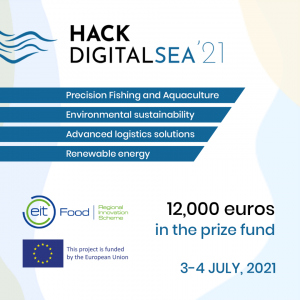
ZeroW
Systemic Innovations Towards a Zero Food Waste Supply Chain
ZeroW has set the ambitious target of playing a key role in the transition of current food systems towards halving Food Loss & Waste (FLW) by 2030 and reaching near-zero FLW by 2050.
ZeroW provides significant impacts through the demonstration of innovations in nine real-life food chains, by employing a systemic innovation approach, to effectively address the multidimensional issue of FLW. This involves:
- Pre-identifying systemic innovations, that incorporate multiple interlinked dimensions (process, organisational, strategy, marketing, product, technological, governance, etc.), which are tested and demonstrated;
- Steering the evolution of innovations towards higher levels of systemic readiness and impact, using a Living Lab co-creation and multi-actor collective learning approach;
iii. Enhancing the Living Lab actors’ innovation advancement capability with shared resources facilitating new ways and means of cooperating and co-developing innovations;
- Developing context-specific trajectories for the systemic innovations (from ideation to scaling-up and commercialisation) leading to the provision of currently missing end products and services that align with consumer attitudes, food actor needs and policy trends.
Moreover, ZeroW establishes a clear ‘FLW impact trajectory’, from demonstrator results (2025), scaled up to meet the F2F 2030 goals, and steered through a ‘just transition pathway’ towards a near-zero FLW in 2050.
The ZeroW project has received funding from the European Union’s Horizon 2020 research and innovation programme under grant agreement No 101036388.
Project website: https://www.zerow-project.eu/
Project coordinator: Inlecom Commercial Pathways Company Limited by Guarantee (Ireland)
Project partners:
- AgriFood Lithuania DIH (Lithuania)
- Allmicroalgae Natural Products SA (Portugal)
- Asociacion de Investigacion de Industrias Carnicas del Principado de Asturias (Spain)
- Asociatia Clusterul Agro-Food-Ind Napoca (Romania)
- Asociatia Transilvania IT (Romania)
- Aves Nobles y Derivados, S.L. (Spain)
- Biosense Institute – Research and Development Institute for Information Technologies in Biosystems (Serbia)
- Digiotouch OU (Estonia)
- DIL Deutsches Institut Fur Lebensmitteltechnik EV (Germany)
- Eigen Vermogen Van Het Instituut Voor Landbouw – En Visserijonderzoek (Belgium)
- Eroski Scoop (Spain)
- F6S Network Ireland Limited (Ireland)
- FBCD AS (Denmark)
- Fondazione Istituto Sui Trasporti e la Logistica (Italy)
- Fundacion Corporacion Tecnologica de Andalucia (Spain)
- Grupo La Caña, S.L. (Spain)
- ICLEI European Secretariat GMBH (Germany)
- Innovatiesteunpunt Voor Landbouw Enplatteland (Belgium)
- Institute of Communication and Computer Systems (Greece)
- Instituto Andaluz de Investigaciony Formacion Agraria Pesquera Alimentaria y de la Produccion Ecologica (Spain)
- Instituto Tecnologico De Aragon (Spain)
- Instituto Tecnologico del Embalaje, Transporte y Logistica (Spain)
- ITC – Inovacijsko Tehnoloski Grozd Murska Sobota (Slovenia)
- Kmetijsko Gozdarska Zbornica Slovenije Kmetijsko Gozdarski Zavod Murska Sobota (Slovenia)
- Konnecta Systems Limited (Ireland)
- Lietuvos Maisto Eksportuotoju Asociacija (LitMEA) (Lithuania)
- Lithuanian Vegetable Producers Association (Lithuania)
- Multiscan Technologies SL (Spain)
- Nederlandse Organisatie Voor Toegepast Natuurwetenschappelijk Onderzoek TNO (Netherlands)
- Novamont SPA (Italy)
- Openbare Vlaamse Afvalstoffenmaatschappij (Belgium)
- Robin Food (Israel)
- Safe Food Advocacy Europe (Belgium)
- Sintef AS (Norway)
- Sonae MC – Servicos Partilhados, SA (Portugal)
- Stichting Katholieke Universiteit Brabant (Netherlands)
- SVZ International BV (Netherlands)
- Termoformas de Levante SL (Spain)
- UAB ART21 (Lithuania)
- Universidade do Minho (Portugal)
- Univerza v Mariboru (Slovenia)
- VLTN GCV (Belgium)
- Voedselbank Limburg (Belgium)
- Wageningen University (Netherlands)
- Waterford Institute of Technology (Ireland)
EWA
10 talented female entrepreneurs from Lithuania will go through a 6-months entrepreneurial programme tailored to create business solutions for specific challenges in agrifood. After this period, they will have the required knowledge, confidence and support to meet and exceed their aspirations, leading them to successfully start and develop sustainable businesses. The programme is designed for women regardless of their age, family situation, experience in business. We just need your idea and willingness to revolutionize the food system together with us!
Online training
Selected entrepreneurs will benefit from 6 months long tailor-made training on specific business and entrepreneurial topics and access to resources to improve their skills.
Mentorship/Ongoing Support
More than 20 hours of personalised mentoring, from experts in business, agrifood and successful entrepreneurs. EIT Food Startup Guide will be offered free of charge.
Power of community
Participation in entrepreneurship and networking events with high-level stakeholders. All applicants will have access to our community and will benefit from EWA network which provides direct access to over 200 mentors and female entrepreneurs within the agrifood ecosystem.
Funding opportunities
Beneficiaries will have the chance to win up to 10,000 euros per country, discover other EIT Food programmes and access investors, business angels and corporates to take their businesses to the next level.
Impact
10 women will be upskilled on how to start their agrifood business and be successful; receiving personalised mentoring, training and becoming part of the big EIT Food community.
The ultimate goal is to overcome the existing gender gap in the agrifood sector with a special focus on suburban and rural areas: promoting inclusivity and diversity between business founders, and increase female founded startups.


